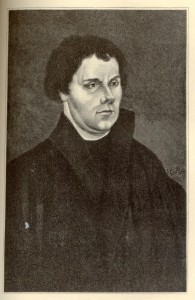| The
forgiving of sin, the considering of the individual as righteous
before God, and the adopting of the individual as a child of God
through faith in Christ. |
 |
|
Martin
Luther in 1525 by Lucas Cranach
|
The claim that
individuals are forgiven their sins and considered righteous by God
through faith in Christ was the central profession of the Protestant
Reformation. The teaching of justification by faith excluded all notion
of human merit and pointed
entirely toward Christ's work as its basis. Various Protestants accented
this teaching differently. Some emphasized that in justification God
counts the sinner forgiven, righteous before God, and adopted. This
is sometimes categorized as "forensic" or legal justification. Other
teachers emphasized that God makes the sinner a forgiven, righteous,
adopted child. Some emphasized the objective work of God in Christ and
others the subjective appropriation of this work. These varying emphases
on occasion caused tension within the various traditions of the Protestant
Reformation. Among the Lutherans, for example, Andreas Osiander maintained
strongly that Christ dwells within the sinner for the sake of justification,
thus emphasizing the subjective, impartative aspect of justification.
Other Lutheran teachers, including M. Flacius Illyricus and Philip
Melanchthon, countered with an emphasis on the objective nature
of God's work and stressed the forensic, imputative character of justification.
|
